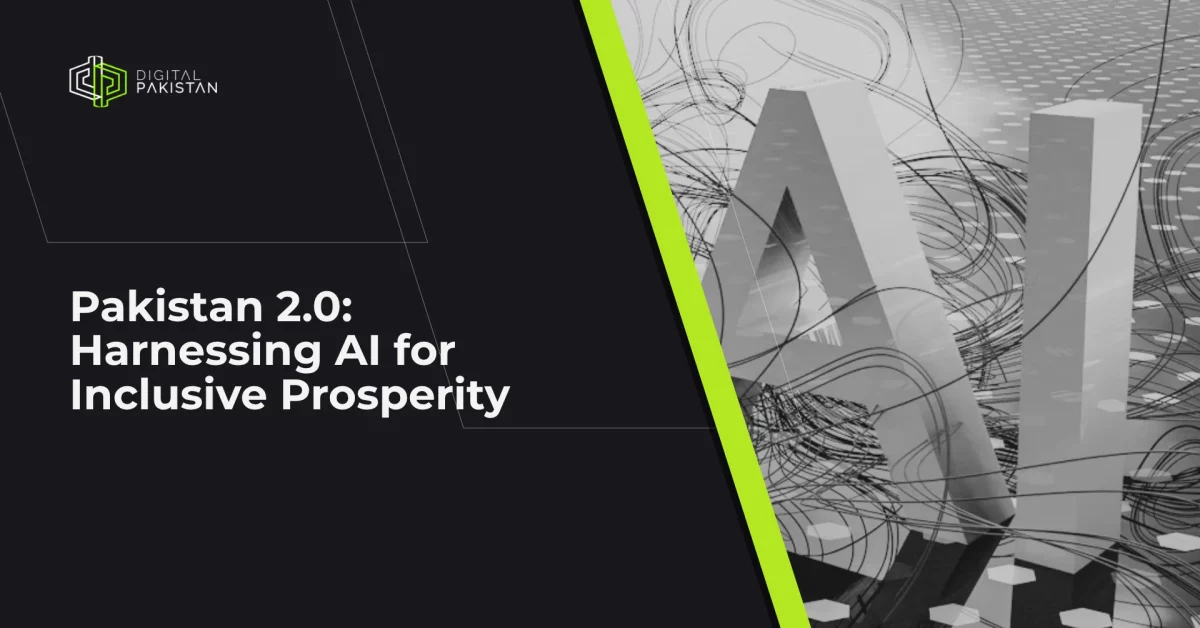
TikTok Sparks STEM Revolution Across Pakistani Screens
August 6, 2025
NDMA and Jazz Send Flood Alerts to 23 Million in Pakistan
August 7, 2025How Pakistan’s AI Ambitions Can Drive Economic Growth
Artificial Intelligence (AI) is fast emerging as a shaping power in the world economy, transforming sectors, enhancing productivity, and opening new vistas. In Pakistan, adopting AI is not merely a question of adopting new technology but about setting the stage for long-term economic growth. With an eye on its national AI policy, nascent public-private collaborations, investing in human capital, and the economic implications, the strategy of Pakistan towards AI can reorient the country’s development process in a significant and equitable manner.
The National AI Strategy: A Visionary Roadmap
Pakistan’s national AI strategy is an important step in the direction of a digital future. Led by the Ministry of Information Technology and Telecommunication under the Digital Pakistan umbrella, the strategy defines a holistic framework for adopting AI across industries. It focuses on four major pillars: enabling infrastructure, data governance, AI research and development, and ethical guidelines on responsible usage.
By setting AI in healthcare, agriculture, education, finance, and governance as priorities, the strategy is meant to address real-world problems with intelligent solutions. For example, diagnostic equipment powered by AI in healthcare can increase rural access to quality services. In agriculture, AI can improve irrigation systems and predict crop yields to boost food security. Such uses demonstrate a good correlation with national priorities and development agendas.
In addition, the approach promotes regulation that fosters innovation without compromising transparency and accountability. One of the focal points is the integrity focus on data security and ethical use of AI to avoid abuse and prejudice. This balanced approach has the potential to enhance public confidence in AI technologies as well as support their sustainability in the long term.
Public-Private Partnerships: A Collaborative Engine
The success of a national AI endeavor is largely contingent on both public and private sector collaboration. In Pakistan, technology companies, educational institutions, startups, and government organizations are starting to collaborate more proactively to address gaps in AI research, infrastructure, and commercial adoption.
Programs like the Presidential Initiative for Artificial Intelligence and Computing (PIAIC) have taken training and entrepreneurship to the masses. Startups in machine learning, data analytics, and automation are being mentored, funded, and incubated by accelerators and innovation labs. Local universities are also contributing in a significant way by establishing AI programs and partnering with technology companies on applied research projects.
These collaborations not only speed up innovation but also provide a platform where ideas find expression as market-ready solutions. From AI-powered fintech platforms to smart cities, the synergies of the public and private sectors are starting to deliver tangible results.
Talent Development: Building the Human Capital Base
No AI strategy will be successful without a solid foundation in human capital. Pakistan’s youth, with its strong digital footprint and love for technology, is a strong asset to work with in this sense. Investment in AI-related education and upskilling programs can enable this segment to contribute fully to the changing economy.
Initiatives are already in progress to incorporate AI-oriented curricula into higher education and vocational training. Universities like NUST, LUMS, and FAST are setting the example by introducing specialized degrees in AI and data science. Coding bootcamps and short courses supported both by government and private platforms are also assisting mid-career individuals to transition into AI-related jobs.
In addition, there is increasing awareness for fostering inclusivity in technology education. Scholarships and outreach initiatives to reach women and underrepresented groups are starting to redefine who gets access to the AI-based economy. Through a more diverse talent pool, Pakistan can ensure that more economic growth and innovation opportunities are spread out.
Economic Impact: Unlocking New Avenues for Growth
The economic effects of AI deployment in Pakistan are far-reaching. International research estimates that AI would add trillions to the global economy over the next few decades, and Pakistan has a lot to benefit if it positions itself well. More productivity, improved delivery of public services, and even the development of new markets entirely are some of the most promising benefits.
In the manufacturing industry, AI can optimize supply chains, foretell maintenance requirements, and optimize energy usage, thus saving costs and enhancing efficiency. In the financial sector, AI-based risk evaluation and fraud management can make digital banking more secure and accessible. Intelligent algorithms-driven personalized customer experiences can be enjoyed by the retail and e-commerce industries.
The jobs market will also change. Although automation may eliminate some repetitive work, it will create new AI development, data management, and ethical governance roles. For a nation like Pakistan with a sizeable working-age population, this transformation offers the prospect of moving into value-added jobs sector, given proper reskilling programs are undertaken.
Moreover, AI will help in better governance through predictive analytics in policy making, machine administration of procedures, and evidence-based decision making. These efficiencies can help increase transparency, accountability, and delivery of services, which eventually lead to a stronger economic ecosystem.
Sustaining Momentum for the Long Term
In order for Pakistan to reap the maximum benefits of AI, policy support and long-term vision need to be consistent. Clarity of regulations, incentives for investments, and global cooperation can be drivers for sustained progress. Incentivizing innovation through grants and tax relief, promoting technology transfer through international collaborations, and ensuring open dialogue between industry specialists and policymakers will be the drivers for sustained momentum.
In addition, localizing AI products to match Pakistan’s linguistic, cultural, and economic heterogeneity will render technologies more effective and meaningful. Whether it is Urdu-speaking voice assistants, local data models, or AI products designed for SMEs, localized innovation can make the dividends of AI inclusive and pervasive.
Conclusion
Pakistan’s AI aspirations are rooted in a vision of inclusive growth, technological empowerment, and economic resilience. Through selective investment in infrastructure, talent, and partnerships, the nation has the resources to make its AI aspirations a reality. Although the journey forward involves careful execution and ongoing cooperation, the groundwork laid today can power steady growth for years to come. By embracing AI as an agent of transformation, Pakistan is not merely keeping up with the digital age it is creating its own destiny.






